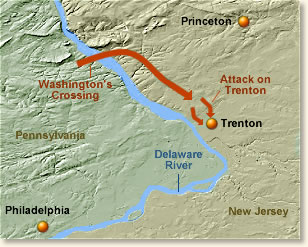 |
| Washington Crossing the Delaware, Emmanuel Leutze, 1850 |
The previous August, the British army arrived–one-fourth of them Hessian soldiers from Germany. The Brits invaded Long Island and forced the Continental Army to Manhattan. The British then attacked Manhattan and forced Washington's troops to retreat along the Hudson River to New Jersey. The British followed, chasing the Americans across the Delaware into Pennsylvania.
At this point the American rebels seemed to be crushed. General Washington was on the run. General Cornwallis was satisfied that the Continental Army was not going to be a threat, having had many defeats and no victories in more than five months.
American morale was low, with many men sick and wounded. Shabbily dressed and poorly trained, they were deserting at high rates. On top of all that, enlistments of most of the militias under Washington's command were due to expire at the end of December and many would be going home. Even Washington thought privately that the jig might be up for the Revolution. By the following spring there would be no army left.
 |
| A Marker Nine Miles Upriver from Trenton |
The weather was terrible, with snow, sleet, and gale-force winds. Washington decided the weather would work in his army's favor, because no one would imagine that the Continental Army would attack during a blizzard.
A few hours before attempting the mission, Washington read aloud to his soldiers from Thomas Paine's The American Crisis. The army was divided into at least three different groups to cross the Delaware, each with a different destination point around Trenton; Washington led one group and put commanders in charge of the others. The river was moving quickly, carrying huge chunks of ice, and they were traveling through a blinding snowstorm.
On Christmas Eve, 2,400 men, 18 cannons, and some horses crossed the river in small boats. Only Washington's group persevered through the brutal weather–the other commanders turned their troops around.
 |
| Washington's army crossed nine miles northwest of Trenton. |
The Tide Was Turned
Early morning December 26, the Continental Army attacked Trenton, surprising a camp composed entirely of unprepared and hungover Hessians. After the loss of their commander, the Hessians surrendered. Washington's victory was complete but his situation precarious. Taking 900-1,000 soldiers captive, they retreated back across the river to Pennsylvania.
It wasn't fully clear at the time, but this victory turned the tide toward the Revolutionaries. It restored everyone's faith in the Continental Army's abilities.
The battle's outcome gave Washington and his officers the confidence to mount another campaign. On December 30 they again crossed the Delaware, this time winning another victory at Trenton on January 2, 1877 and then pushing on to Princeton, where they defeated the British on January 3. The victories stunned the British and were a magnet for support of the new nation by potential allies– France, Holland and Spain.
Eye Witness Report
Elisha Bostwick, a soldier in the Continental Army, said in his memoirs of the battle:
[We] encamped on the Pennsylvania side [of the Delaware] and there remained to the 24th December. [T]oward evening [we] began to re-cross the Delaware but by obstructions of ice in the river did not all get across till quite late in the evening, and all the time a constant fall of snow with some rain, and finally our march began.
[General Washington rode by and said:] "Soldiers, keep by your officers. For God's sake, keep by your officers!" Spoke in a deep and solemn voice. ... Our horses were then unharnessed and the artillery men prepared. We marched on and it was not long before we heard the out sentries of the enemy both on the road we were in and the eastern road, and their out guards retreated firing, and our army, then with a quick step pushing on upon both roads, at the same time entered the town. Their artillery taken, they resigned with little opposition, about nine hundred, all Hessians, with 4 brass field pieces. When crossing the Delaware with the prisoners in flat bottom boats the ice continually stuck to the boats... [T]he next day [we] recrossed the Delaware again and returned back to Trenton, and there on the first of January 1777 our years service expired, and then by the pressing solicitation of [General Washington,] a part of those whose time was out consented on a ten dollar bounty to stay six weeks longer, and although desirous as others to return home, I engaged to stay that time.Sources: Garrison Keillor, Writer's Almanac, December 25, 2014. Henry Steele Commager and Robert B. Morris, The Spirit of 'Seventy Six (1958). David Hackett Fischer, Washington's Crossing (2004). "Washington Crosses the Delaware, 1776," EyeWitness to History (2004).
No comments:
Post a Comment